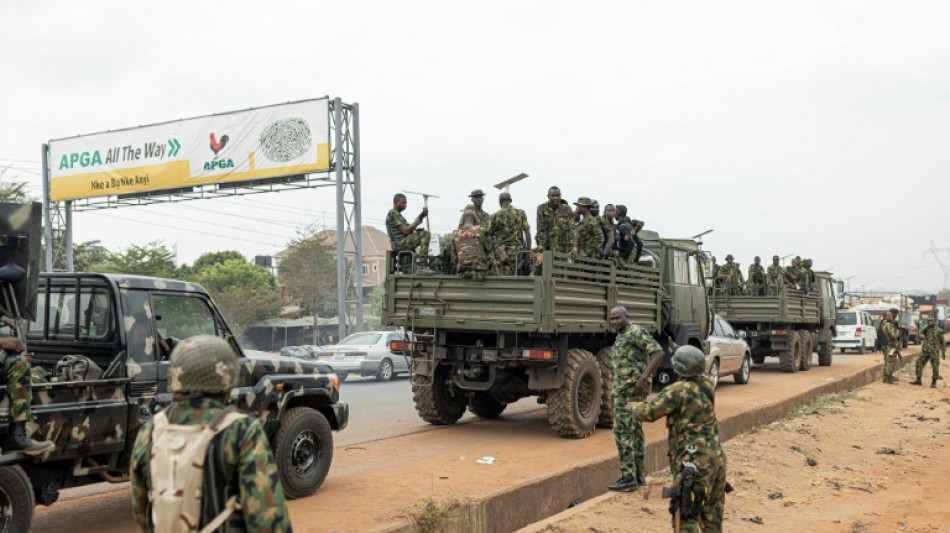

Jihadists in Nigeria turn to TikTok to spread propaganda
Jihadists in northeastern Nigeria are surging -- and using social media to spread the word of their campaigns and recruit fighters.
At least 100 people were killed in the new wave of jihadist attacks in April alone, as the governor of Borno, the epicentre of the violence which has raged since 2009, said the state is losing ground to armed groups.
At the same time, apparent jihadists and their boosters on TikTok were flaunting rifles, grenades and stacks of cash, according to easily accessible videos reviewed by AFP that same month.
They broadcast live in joint videos with accounts run by men preaching anti-Western ideologies in a style reminiscent of the videos released by deceased Boko Haram leader Abubakar Shekau in the early days of the 15-year-old insurgency.
Criminal gangs that carry out raids on villages and kidnap for ransom in the northwest of the country have used TikTok in the past.
"It started with bandits," Bulama Bukarti, a vice president at Texas-based Bridgeway Foundation wrote on X. "Now, Boko Haram members are hosting live TikTok shows -- spreading propaganda, justifying their violence and threatening anyone who dares speak against them."
A Boko Haram fighter threatened Bukarti himself in a now-deleted TikTok video for speaking against the group, he said.
While many of the accounts on the video sharing app have been flagged and taken down, the capability of broadcasting live streams on the platform adds another layer of difficulty to monitoring the content they put out.
A TikTok spokesperson said it was difficult to quantify the number of accounts linked to terrorist organisations that have been taken down.
While some of these accounts have been deleted, several others remain active, according to accounts viewed by AFP at the time of publication.
"Terrorist groups and content related to these groups have no place on TikTok, and we take an uncompromising stance against enabling violent extremism on or off our platform," a spokesperson for the company told AFP in an emailed statement.
- 'It's paying off' -
Among the 19 accounts reviewed by AFP were men dressed as clerics, their faces revealed to the camera even as they called for violence against the government and teamed up with accounts that showed off weapons hauls.
Accounts also post old footage of the original Boko Haram founder, Mohammed Yusuf, and those of Isah Garo Assalafy, who was banned from preaching in public places in Niger state for using violent rhetoric against democracy and Western civilisation.
These accounts frequently go live, interacting with followers, answering questions and receiving digital gifts that can be converted into cash.
Nigeria's jihadist conflict, which over the years has expanded to include a rival Islamic State group, has killed more than 40,000 and displaced some two million people in Africa's most populous country.
Saddiku Muhammad, a former jihadist who has since defected, told AFP that armed groups are turning to TikTok in part because security forces cracked down on the encrypted messaging app Telegram.
They also know TikTok is popular with young people.
"Jihadists realised that to capture the minds of young people, they need to speak to them in the language they understand -- instead of the traditional didactic and demagogic styles that are boring and unattractive to them," Muhammad said.
"From all indications, it is paying off. They are reaching out to young potential recruits."
- 'They aren't afraid' -
Analysts told AFP that the use of TikTok by members of armed groups is a direct challenge to the government.
Malik Samuel, an Abuja-based security analyst at the pan-African think tank Good Governance Africa, said it is a common Boko Haram tactic to use the group's young members to spread propaganda.
"I believe showing their faces is strategic -- to show that they aren't afraid and to let their target know that they are engaging with real people," Samuel said.
Islamic State West Africa Province, however, still appears to follow a more polished, top-down communication strategy than the apparent Boko Haram jihadists posting on TikTok, he said.
TikTok said it has partnered with UN-backed Tech Against Terrorism to improve the detection and removal of violent extremist content.
"Our community guidelines clearly state that we do not allow the presence of violent and hateful organisations or individuals on our platform," it said.
"We will always take action on content found to violate these policies."
T.Hofmann--NRZ




